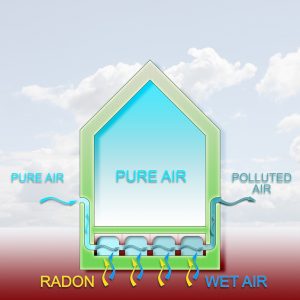 Smoking can cause gene mutations in the lungs, which is what makes it the leading cause of lung cancer. However, smoking isn’t the only cause of cancer.
Smoking can cause gene mutations in the lungs, which is what makes it the leading cause of lung cancer. However, smoking isn’t the only cause of cancer.
Radon exposure has been known to cause lung cancer deaths in up to 20,000 Americans every year. What’s more, approximately 2,900 of those same Americans have never smoked.
What Is Radon?
Radon is a naturally occurring radioactive gas. When uranium breaks down in the earth, radon is released as a product. People have never been exposed to radon long enough in the natural world for it to become a problem.
However, radon can also make its way into the American home through your basement, sump pump, or through the water. Because the radon in your home doesn’t have an outlet, it can build up and become dangerous.
How Does Radon Cause Cancer?
Cancer is caused by genetic mutations that occur after birth. Radon gas is a carcinogen, which means its radioactivity can cause gene mutations in living tissue.
When this colorless gas builds up in your home, you breathe in large amounts. Radon particles then become trapped in your lungs where they break down and cause tissue damage.
According to the World Health Organization, those who smoke are 25 times more at risk for lung cancer when additionally exposed to radon in their home. This is because the lung damage caused by smoking is then exacerbated by the radon exposure.
How Can You Lower Your Risk Of Lung Cancer?
Radon exposure may sound scary, but the good news is it can be easily tested for and mitigated by a team of professionals. A radon abatement service will first test for radon in your home to determine if the levels are at or above EPA action level.
Although no percentage of radon is safe in the home, radon levels at or above 4 pCi/L are especially dangerous. Depending on the levels in your home, the radon abatement and mitigation service will then take action.
Your service will establish a radon mitigation system in your home. This system works by increasing ventilation to push the radon outside the home through the use of fans. Depressurization is also one of the most common methods of reducing radon.
Radon is impossible to detect without local radon testing. Consider testing for radon today with Affordable Radon Colorado to ensure your home is safe and sound.

Recent Comments